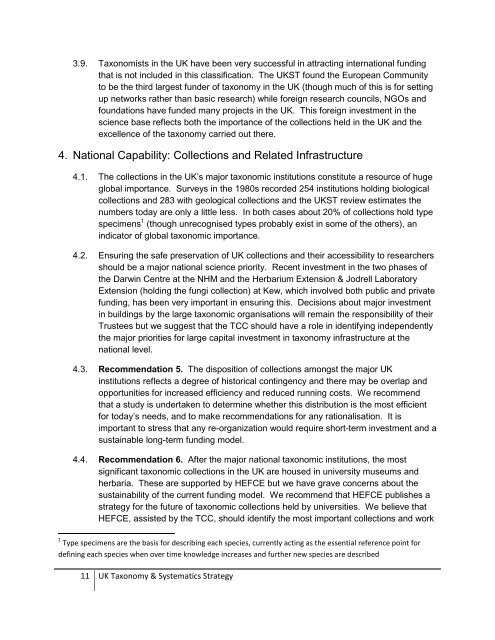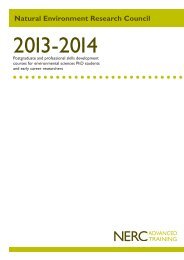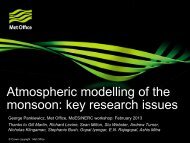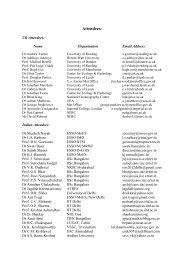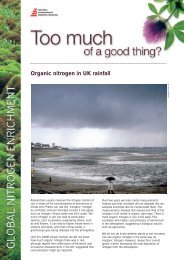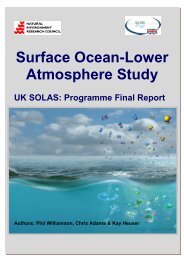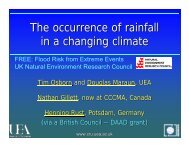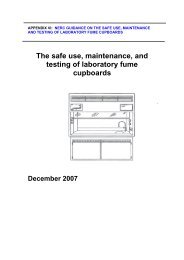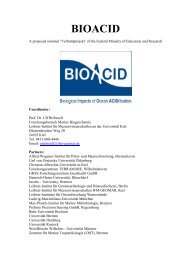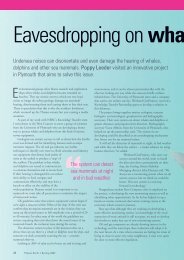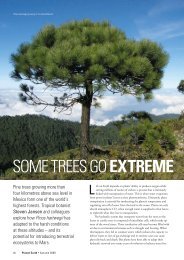Developing a National Strategy in Taxonomy & Systematics (168KB)
Developing a National Strategy in Taxonomy & Systematics (168KB)
Developing a National Strategy in Taxonomy & Systematics (168KB)
Create successful ePaper yourself
Turn your PDF publications into a flip-book with our unique Google optimized e-Paper software.
3.9. Taxonomists <strong>in</strong> the UK have been very successful <strong>in</strong> attract<strong>in</strong>g <strong>in</strong>ternational fund<strong>in</strong>g<br />
that is not <strong>in</strong>cluded <strong>in</strong> this classification. The UKST found the European Community<br />
to be the third largest funder of taxonomy <strong>in</strong> the UK (though much of this is for sett<strong>in</strong>g<br />
up networks rather than basic research) while foreign research councils, NGOs and<br />
foundations have funded many projects <strong>in</strong> the UK. This foreign <strong>in</strong>vestment <strong>in</strong> the<br />
science base reflects both the importance of the collections held <strong>in</strong> the UK and the<br />
excellence of the taxonomy carried out there.<br />
4. <strong>National</strong> Capability: Collections and Related Infrastructure<br />
4.1. The collections <strong>in</strong> the UK’s major taxonomic <strong>in</strong>stitutions constitute a resource of huge<br />
global importance. Surveys <strong>in</strong> the 1980s recorded 254 <strong>in</strong>stitutions hold<strong>in</strong>g biological<br />
collections and 283 with geological collections and the UKST review estimates the<br />
numbers today are only a little less. In both cases about 20% of collections hold type<br />
specimens 1 (though unrecognised types probably exist <strong>in</strong> some of the others), an<br />
<strong>in</strong>dicator of global taxonomic importance.<br />
4.2. Ensur<strong>in</strong>g the safe preservation of UK collections and their accessibility to researchers<br />
should be a major national science priority. Recent <strong>in</strong>vestment <strong>in</strong> the two phases of<br />
the Darw<strong>in</strong> Centre at the NHM and the Herbarium Extension & Jodrell Laboratory<br />
Extension (hold<strong>in</strong>g the fungi collection) at Kew, which <strong>in</strong>volved both public and private<br />
fund<strong>in</strong>g, has been very important <strong>in</strong> ensur<strong>in</strong>g this. Decisions about major <strong>in</strong>vestment<br />
<strong>in</strong> build<strong>in</strong>gs by the large taxonomic organisations will rema<strong>in</strong> the responsibility of their<br />
Trustees but we suggest that the TCC should have a role <strong>in</strong> identify<strong>in</strong>g <strong>in</strong>dependently<br />
the major priorities for large capital <strong>in</strong>vestment <strong>in</strong> taxonomy <strong>in</strong>frastructure at the<br />
national level.<br />
4.3. Recommendation 5. The disposition of collections amongst the major UK<br />
<strong>in</strong>stitutions reflects a degree of historical cont<strong>in</strong>gency and there may be overlap and<br />
opportunities for <strong>in</strong>creased efficiency and reduced runn<strong>in</strong>g costs. We recommend<br />
that a study is undertaken to determ<strong>in</strong>e whether this distribution is the most efficient<br />
for today’s needs, and to make recommendations for any rationalisation. It is<br />
important to stress that any re-organization would require short-term <strong>in</strong>vestment and a<br />
susta<strong>in</strong>able long-term fund<strong>in</strong>g model.<br />
4.4. Recommendation 6. After the major national taxonomic <strong>in</strong>stitutions, the most<br />
significant taxonomic collections <strong>in</strong> the UK are housed <strong>in</strong> university museums and<br />
herbaria. These are supported by HEFCE but we have grave concerns about the<br />
susta<strong>in</strong>ability of the current fund<strong>in</strong>g model. We recommend that HEFCE publishes a<br />
strategy for the future of taxonomic collections held by universities. We believe that<br />
HEFCE, assisted by the TCC, should identify the most important collections and work<br />
1 Type specimens are the basis for describ<strong>in</strong>g each species, currently act<strong>in</strong>g as the essential reference po<strong>in</strong>t for<br />
def<strong>in</strong><strong>in</strong>g each species when over time knowledge <strong>in</strong>creases and further new species are described<br />
11 UK <strong>Taxonomy</strong> & <strong>Systematics</strong> <strong>Strategy</strong>


